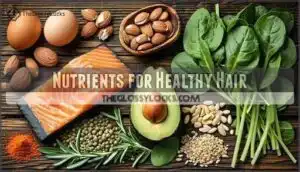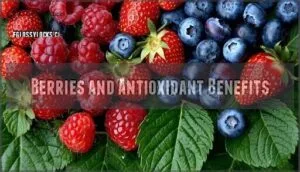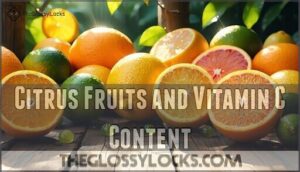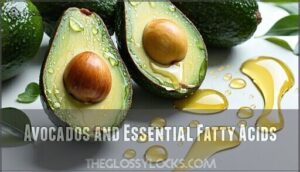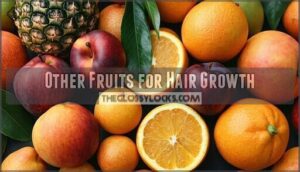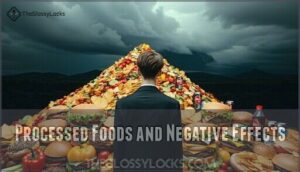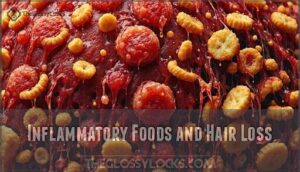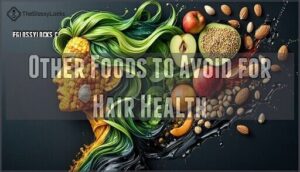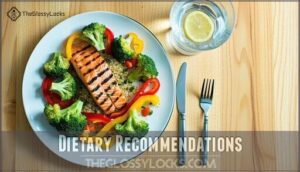This site is supported by our readers. We may earn a commission, at no cost to you, if you purchase through links.
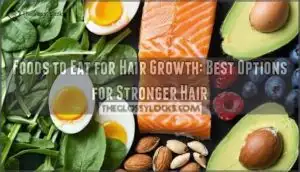
Biotin-rich nuts and seeds provide essential building blocks, while vitamin C from berries boosts collagen production for healthier strands.
Sweet potatoes deliver beta-carotene that converts to vitamin A, supporting cell turnover in your scalp.
Don’t overlook avocados – their healthy fats keep hair moisturized and flexible.
The secret isn’t just what you eat, but how these nutrients work together to create the perfect environment for your hair’s natural growth cycle.
Table Of Contents
- Key Takeaways
- Foods for Hair Growth
- Nutrients for Healthy Hair
- Fruits for Hair Health
- Foods to Avoid for Hair
- Dietary Recommendations
- Frequently Asked Questions (FAQs)
- What foods help hair growth?
- How can a healthy diet improve hair growth?
- What foods help with hair loss?
- Which foods increase hair growth?
- What to drink to grow hair?
- What vitamin am I lacking if my hair is falling out?
- What stimulates hair growth best?
- What foods help grow thick hair?
- What foods are beneficial for hair growth?
- Are vegetables good for hair growth?
- Conclusion
Key Takeaways
- You’ll fuel stronger hair growth by eating protein-rich eggs, omega-3-packed salmon, and iron-loaded spinach that provide essential building blocks your follicles need to thrive.
- You should include biotin-rich nuts and seeds alongside vitamin C from berries, which work together to strengthen strands and boost collagen production for healthier hair.
- You can’t ignore the power of sweet potatoes and avocados – they deliver beta-carotene and healthy fats that support cell turnover and keep your hair moisturized from within.
- You’ll want to avoid processed foods, excessive alcohol, and crash diets that trigger inflammation and strip away the nutrients your hair desperately needs to grow strong.
Foods for Hair Growth
Your hair’s health starts with what you put on your plate, as certain foods contain the essential vitamins, minerals, and proteins your follicles need to grow strong strands.
From leafy greens packed with iron to protein-rich eggs, the right foods can help you achieve the healthy hair you’re after.
Leafy Greens and Hair Health
Leafy greens pack a powerful punch for hair growth foods.
Spinach delivers over 20% daily iron, fueling hair follicle health through improved scalp circulation.
Kale’s chlorophyll benefits include detoxification effects that clear toxins from your system.
These iron rich foods boost folate absorption, supporting DNA synthesis in hair cells.
The mineral content in collard greens and arugula strengthens strands naturally.
Nuts and Seeds for Hair Strength
Among nature’s powerhouses, nuts and seeds pack essential nutrients that fuel stronger hair from root to tip.
These hair growth foods deliver zinc, vitamin E, and protein your follicles crave for maximum strength.
- Almonds provide 49% of daily vitamin E – protecting your scalp like a natural shield
- Pumpkin seeds deliver 19% of zinc needs – the mineral your hair follicles desperately require
- Walnuts boost hair elasticity – keeping strands flexible and break-resistant
Seed oil benefits extend beyond surface-level improvements.
Nutrients in nuts support the hair growth cycle, while seed variety guarantees complete amino acid profiles.
Smart nut consumption means choosing raw options over processed – roasting effects can diminish nutrient density.
These hair strengthening foods work best when you enjoy a handful daily, supporting follicle health naturally.
Fatty Fish and Omega-3 Benefits
Fatty fish pack a powerful punch for your hair’s health. Research shows omega-3 consumption reduces hair loss by 62% and boosts hair diameter by 20%. These marine nutrients improve scalp circulation while fighting inflammation that weakens follicles.
Omega-3s supercharge your hair follicles, slashing hair loss while boosting strand thickness dramatically.
| Fish Type | Omega-3 Content (per 100g) | Key Hair Benefits |
|---|---|---|
| Salmon | 2.3g | Enhanced hair density, reduced shedding |
| Sardines | 1.5g | Stronger strands, scalp health |
| Mackerel | 2.6g | Improved follicle cycling |
| Herring | 1.7g | Anti-inflammatory protection |
| Lake Trout | 1.6g | Better nutrient absorption |
The omega-3 types EPA and DHA found in fatty fish outperform plant sources for hair growth nutrients. These sustainable sources deliver marine-based nutrients that your body absorbs more effectively. Including two servings weekly supports your healthy hair diet by prolonging growth phases and reducing breakage. Choose wild-caught options when possible for maximum omega3 for hair benefits.
Sweet Potatoes and Beta-Carotene
Sweet potatoes pack a powerful punch for your healthy hair diet through their rich beta-carotene content.
Your body converts this orange pigment into vitamin A, which supports hair follicle health and growth.
Try roasting sweet potato wedges or adding them to smoothies for better beta-carotene absorption.
Other orange vegetable alternatives like carrots and butternut squash offer similar benefits for stronger hair, supporting your overall hair follicle health.
Eggs and High-Quality Protein
Eggs pack a protein punch that’s hard to beat for hair health.
With complete amino acids and high-quality egg protein, they fuel follicle growth effectively.
You’ll get biotin, zinc, and selenium too – nutrients that prevent protein deficiency signs like thinning strands.
Eggs also contain biotin, which is essential for keratin production needs.
Unlike some vegetarian protein sources, eggs offer superior protein absorption rates without supplementation risks.
Nutrients for Healthy Hair
Your hair’s health depends on getting the right mix of vitamins, minerals, and nutrients that fuel follicle function and support strong strands.
Understanding which nutrients matter most can help you make smarter food choices that promote thicker, healthier hair growth.
Vitamin a and Hair Growth
Vitamin A works like a master architect for your hair follicles, regulating cell growth and supporting healthy strand formation.
You’ll find two vitamin A forms: preformed vitamin A (retinol) from animal sources and betacarotene from leafy vegetables like spinach and carrots.
Your body converts betacarotene into usable retinol, boosting follicle health by up to 50%. However, exceeding 3,000 micrograms daily creates toxicity risks and hair thinning.
Deficiency symptoms include brittle, patchy hair loss.
Omega-3 Fatty Acids and Hair Health
Your scalp thrives when you feed it omega-3 fatty acids, which combat scalp inflammation and boost hair density.
These essential fats strengthen follicles from within, creating the perfect environment for robust growth.
Key omega-3 sources include:
- Fatty fish – salmon, mackerel, and sardines pack the most punch
- Fish oil supplements – convenient backup when fresh options aren’t available
- Plant sources – walnuts, flaxseeds, and chia seeds offer alternative fatty acid types
Research shows omega-3s reduce hair loss while promoting thicker hair through improved circulation and reduced inflammation.
Iron and Hair Growth Importance
Two out of three women experiencing hair loss show low iron stores, making iron deficiency a silent thief of healthy hair.
Iron deficiency silently steals your hair’s strength, leaving follicles starving for the oxygen they desperately need.
You can’t build strong strands without adequate iron levels supporting your follicles’ oxygen needs.
| Iron Status | Ferritin Level | Hair Impact |
|---|---|---|
| Deficient | Below 30 ng/mL | Excessive shedding |
| Borderline | 30-70 ng/mL | Thinning strands |
| Ideal | Above 70 ng/mL | Strong growth |
Iron deficiency disrupts your hair’s growth cycle, forcing follicles into premature shedding phases.
Include iron sources like red meat, spinach, and lentils with vitamin C foods to maximize iron absorption and restore ferritin levels for healthier hair.
Zinc and Hair Health Effects
When your hair starts thinning, zinc deficiency might be the culprit behind telogen effluvium.
This reversible hair loss condition responds well to adequate zinc intake from sources like oysters, nuts, and legumes.
However, supplementation risks exist—too much zinc can actually worsen hair loss and interfere with iron absorption, so focus on getting this essential mineral through your diet for healthy hair.
Ensuring sufficient intake of vitamin D benefits may also help.
Biotin and Hair Strength Role
Beyond zinc’s role in maintaining follicle health, biotin acts as your hair’s building block.
This B-vitamin supports hair strength by helping your body produce keratin, the protein that forms each strand.
Biotin deficiency can weaken hair, making biotin-rich foods essential for healthy hair follicle health.
- Biotin sources: Eggs, nuts, and legumes provide natural biotin for daily value requirements
- Hair growth vitamins: Biotin works alongside other nutrients to support stronger strands
- Biotin absorption: Your body processes this vitamin efficiently from whole food sources
Fruits for Hair Health
Fruits pack powerful nutrients that directly support hair growth and strength.
You’ll find vitamin C in berries and citrus fruits protecting your hair follicles from damage, while avocados deliver healthy fats that keep your scalp moisturized and hair shiny.
Berries and Antioxidant Benefits
Berries pack a powerful punch with Berry Antioxidants that shield your hair follicles from Free Radicals.
These colorful gems boost vitamin C levels, supporting Collagen Boost for stronger strands and improved Hair Strength.
Strawberries, blueberries, and raspberries enhance Scalp Health while promoting natural hair growth through their rich antioxidant content that fights oxidative stress.
You can find specialized berry products that may further enhance these benefits.
Citrus Fruits and Vitamin C Content
While berries pack powerful antioxidants, citrus fruits deliver vitamin C that’s essential for collagen production and iron absorption.
Oranges, grapefruits, and lemons provide citrus antioxidants that protect your scalp health from free radical damage.
You’ll want to include fruit variety in your daily intake since vitamin C supports stronger hair follicles and enhances nutrient absorption for maximum growth.
You can also find citrus vitamin C products to supplement your diet.
Avocados and Essential Fatty Acids
The creamy avocado packs powerful nutrients for stronger hair.
Rich in healthy fats and vitamin E, this fruit nourishes your scalp and promotes hair hydration from within.
You can find various hair products infused with avocado oil.
- Avocado oil penetrates hair shafts, delivering deep moisture
- Healthy fats support scalp health and reduce inflammation
- Vitamin E acts as an antioxidant, protecting hair follicles
- Omega-3 fatty acids boost hair growth and prevent breakage
Other Fruits for Hair Growth
Tropical fruits like papaya boost circulation with folic acid, while guava’s vitamin C prevents breakage.
Stone fruits including peaches support scalp health, and kiwi’s copper delays greying.
Dried fruits offer concentrated nutrients, though fresh options provide better hydration for ideal hair growth.
Certain fruits like oranges are beneficial due to their rich Vitamin C content.
| Fruit Category | Key Nutrients | Hair Benefits |
|---|---|---|
| Tropical Fruits | Folic acid, Vitamin C, Enzymes | Enhanced circulation, reduced inflammation |
| Stone Fruits | Vitamins A & C, Potassium | Scalp barrier support, hormone balance |
| Uncommon Fruits | Copper, Zinc, Antioxidants | Melanin synthesis, follicle strength |
| Fruit Smoothies | Mixed vitamins, minerals | Convenient nutrient delivery system |
The table summarizes the benefits of different fruit categories, highlighting the key nutrients and hair benefits associated with each.
Foods to Avoid for Hair
While certain foods can boost hair growth, others can sabotage your follicles and leave you with thinning strands.
You’ll want to steer clear of ultra-processed foods, excessive alcohol, and crash diets that strip away the nutrients your hair needs to thrive.
Processed Foods and Negative Effects
While fruits provide powerful antioxidants and vitamins for hair health, ultraprocessed foods work against your follicles in devastating ways.
These convenient but harmful choices spike inflammation, disrupt hormones, and deplete essential nutrients your hair desperately needs. Alcohol compounds the damage by stripping away zinc and B vitamins.
- Inflammation from processed foods creates a hostile environment for hair growth
- Hormonal disruption throws your natural hair cycle completely off balance
- Nutrient depletion leaves follicles starving for essential vitamins and minerals
- Mercury exposure from certain processed foods can trigger unexpected hair shedding
Inflammatory Foods and Hair Loss
Inflammation acts like a silent saboteur, targeting your hair follicles from within.
Processed foods, excessive alcohol, and crash diets trigger chronic inflammation that damages hair growth cycles.
Studies show pro-inflammatory diets increase hair loss risk by 4%.
Sugar spikes androgen levels, shrinking follicles, while poor gut health from fiber deficiency impairs nutrient absorption needed for strong hair.
An inflammatory diet can also lead to increased oxidative stress, further harming hair follicles.
Other Foods to Avoid for Hair Health
Beyond inflammation, alcohols impact your hair by depleting essential B vitamins and zinc.
Mercury exposure from certain fish can disrupt keratin production. Crash diets create nutritional deficiencies that stress hair follicles.
Fiber-deficient diets impair nutrient absorption needed for growth. High-dose vitamins, particularly A and selenium, paradoxically trigger hair loss prevention concerns rather than benefits.
Dietary Recommendations
You’ll need a well-rounded approach that goes beyond individual foods to maximize hair growth potential.
Focus on creating balanced meals that combine protein, healthy fats, and nutrient-dense whole foods for ideal results.
Balanced Diet for Hair Health
For ideal hair health support, you’ll need a balanced diet that goes beyond single nutrients.
Think of your plate as a hair growth toolkit—combine protein sources like eggs and fish with colorful vegetables for micronutrient sufficiency.
Proper hydration effects extend to your scalp, while gut health enhances nutrient absorption.
Managing stress reduction also supports dietary balance.
Whole Grains and Hair Growth
Many whole grains pack essential nutrients that fuel hair growth from the inside out.
These complex carb benefits include B vitamins for follicle health, iron for circulation, and zinc for hair strength.
Their fiber content supports grain nutrient absorption while promoting scalp wellness.
Including omega-3s from flaxseeds can further boost hair health.
- Oats and brown rice deliver biotin rich foods and B vitamins essential for the hair growth cycle
- Quinoa provides grain-based protein that builds keratin, your hair’s main structural component
- Whole wheat offers iron and zinc for hair, preventing deficiencies linked to thinning
- Fiber and scalp health connect through improved gut function and nutrient uptake
- Magnesium connection from grains helps manage stress hormones that can disrupt hair cycles
Legumes and Hair Health Importance
Beans, lentils, and chickpeas pack protein for hair alongside folate benefits that support healthy growth cycles.
These legume protein sources offer vegetarian hair nutrition through biotin sources and minerals that boost iron absorption.
You’ll find biotin rich foods like black beans contain zinc too, making legumes ideal for hair strength while supporting foods for thicker hair naturally.
Vitamin C-Rich Foods and Benefits
Vitamin C works like your hair’s personal bodyguard, protecting follicles through antioxidant protection while boosting collagen synthesis for stronger strands.
Bell peppers, strawberries, and citrus fruits deliver this powerhouse nutrient, improving scalp circulation and hair strength.
Pairing vitamin C-rich food sources with iron enhances absorption—try strawberries with spinach or bell peppers with lean protein for maximum benefits to improve your hair’s overall health through collagen synthesis.
Frequently Asked Questions (FAQs)
What foods help hair growth?
Nourishing your locks requires feeding them from within—think of your hair as a garden needing specific nutrients to flourish.
You’ll boost growth with protein-rich eggs, omega-3-packed salmon, iron-loaded spinach, and antioxidant berries that protect follicles.
How can a healthy diet improve hair growth?
A healthy diet supplies essential nutrients like protein, iron, zinc, and vitamins that strengthen hair follicles, prevent deficiencies causing hair loss, and support growth cycles for thicker, stronger strands.
What foods help with hair loss?
Eggs, fatty fish, nuts, and leafy greens provide essential nutrients that combat hair loss. These protein-rich foods supply biotin, iron, zinc, and vitamins that strengthen follicles and reduce shedding effectively.
Which foods increase hair growth?
Looking to turn thin strands into luscious locks? You’ll need protein-rich eggs, fatty fish like salmon, leafy greens, nuts, seeds, and antioxidant-packed berries to fuel follicles and boost growth naturally.
What to drink to grow hair?
Water supports hair growth by maintaining scalp hydration and nutrient transport.
You’ll also benefit from green tea’s antioxidants, which protect follicles from damage, and protein smoothies that provide building blocks for strong hair strands.
What vitamin am I lacking if my hair is falling out?
Hair loss often signals deficiencies in iron, vitamin D, B12, biotin, or zinc. Women frequently lack iron, while protein deficiency also causes shedding since hair’s primarily protein-based.
What stimulates hair growth best?
Protein-rich foods like eggs and salmon stimulate hair growth best by providing essential building blocks. Biotin, iron, and omega-3 fatty acids fuel follicles while antioxidants protect strands from damage.
What foods help grow thick hair?
Like seeds need rich soil to sprout strong roots, your hair thrives on protein-packed eggs, omega-3-rich salmon, iron-loaded spinach, and zinc-filled oysters to grow thick and healthy strands.
What foods are beneficial for hair growth?
Eat protein-rich eggs, fatty fish like salmon, and iron-packed spinach for stronger strands. Nuts, seeds, and legumes provide zinc and biotin that fuel growth cycles naturally.
Are vegetables good for hair growth?
Yes, vegetables are excellent for hair growth.
Spinach, kale, and peppers provide vitamins A and C, which support follicle health and collagen production.
Sweet potatoes offer beta-carotene, while broccoli contains biotin and folate—all essential nutrients for healthy hair.
Conclusion
Remember, your hair’s growth doesn’t happen overnight – it’s truly a marathon, not a sprint.
By consistently including foods to eat for hair growth like protein-rich eggs, omega-3-packed salmon, and iron-loaded leafy greens in your diet, you’ll create the ideal environment for stronger strands.
These nutrient-dense choices work together to nourish your follicles from within, supporting your hair’s natural growth cycle and helping you achieve the healthy, vibrant hair you desire.
- https://jayceenaturals.com/blogs/news/the-hair-growth-secret-proven-fruits-that-actually-work
- https://www.menshealth.com/uk/nutrition/a28165635/baldness-fruits/
- https://skinkraft.com/blogs/articles/best-fruits-for-hair-growth
- https://us.typology.com/library/pomegranate-juice-what-are-its-effects-on-hair-and-the-scalp
- https://www.frontiersin.org/journals/nutrition/articles/10.3389/fnut.2024.1433962/full

